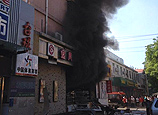
According to the NDRC announcement, prices for existing gas usage will see a price hike of no more than 400 yuan per thousand cubic meters. Meanwhile, new usage price is pegged to 85 percent of a basket price of alternative fuels.
Price reforms for not only natural gas, but also electricity and water are also high on the government's agenda this year. The government called for a progressive pricing mechanism, according to a set of guidelines on economic reforms approved by the State Council in May.
Prices of other industrial products, like chemical fertilizers that depend on natural gas, are expected to rise, and that will push up the cost of agricultural products.
At local level, regional governments have de-facto power over the retail price of natural gas charged by stations, because without the approval from local authorities, gas stations technically could not pass price hikes on to their customers.
As economic growth has slowed, the government has stepped up efforts in pushing forward structural reforms, including more market-oriented pricing models for energy resources.
China's natural gas consumption has rocketed in the last decade, rising to more than 146 billion cubic meters in 2012 from 24.5 billion in 2000.
Its reliance on imported natural gas also soared, increasing to 42.5 billion cubic meters in 2012 from 60 million in 2006.
Still, natural gas accounts for around 5 percent of China's primary energy consumption, considerably lower than the average of about 20 percent worldwide.
According to a national five-year development plan for natural gas, China aims to increase imports to 93.5 billion cubic meters and total consumption to nearly 230 billion by 2015, taking up a 7.5 percent share of primary energy consumption.
One key hurdle, identified in the plan, is the long-held price control which curbed profitability of domestic production and forced gas importers, including the country's largest gas producer, China National Petroleum Corporation (CNPC), to sell at prices lower than their costs.
PetroChina, CNPC's listed subsidiary, reported a loss of 41.9 billion yuan on its natural gas import business in 2012, largely offsetting the profits from its domestic gas business.
Other oil and gas giants, Sinopec and CNOOC, are set to benefit from the price hikes, according to rating agencies Moody's and Fitch.
For mid-stream players in the gas industry, Fitch believes city gas distributors can pass on cost increases to a large majority of their commercial and industrial customers, who account for around 80 percent of the natural gas use in China.
Documents seen by Xinhua showed that Harbin municipal government is prepared to allow retail price of gas to rise along with the wholesale cost.
Local governments across the country will inevitably make similar decisions, said Wang, the SCI energy analyst.
"The artificially low natural gas tariff relative to other energy sources and the burden it places on natural gas suppliers is one impediment to the sustainable growth of the industry," said Moody's.
The rating agency added that China is intent to resolve the structural problems of the natural gas industry so it can develop on a more sustainable basis. (Wang Song contributed to reporting)

















 People hold funeral for deceased relatives in quake-hit region
People hold funeral for deceased relatives in quake-hit region


![]()
